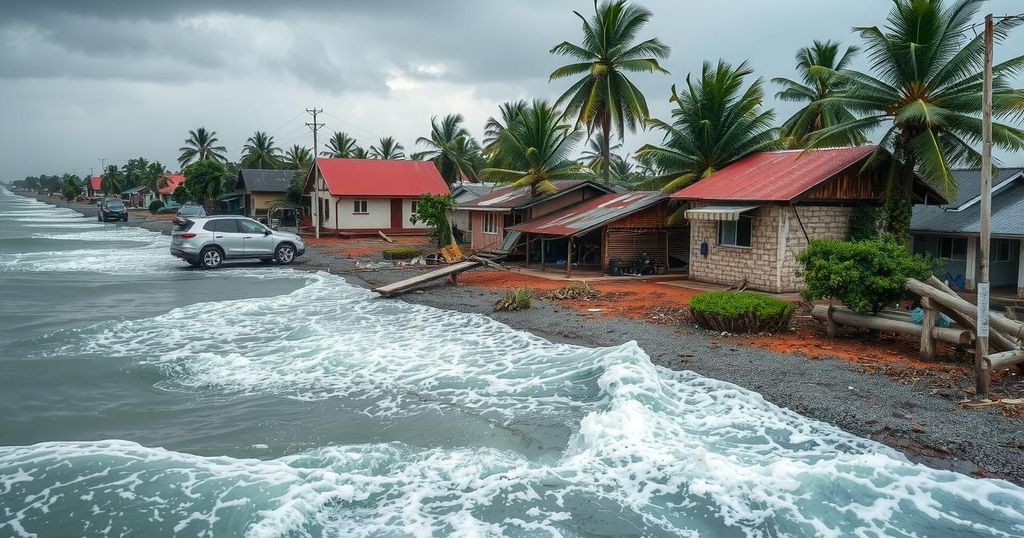Madagascar Assesses Damage from Cyclone Chido as It Moves to Mozambique

Tropical Cyclone Chido has hit Mayotte and the Comoros, affecting approximately 2.5 million people in its path and is forecasted to impact Mozambique with heavy rains and strong winds. Initial assessments indicate property damage in the Comoros, and authorities are mobilizing emergency plans across the region to prepare for potential flooding and mudslides.
Tropical Cyclone Chido, which intensified over the south-eastern Indian Ocean, has recently impacted Mayotte and the Comoros and is en route to Mozambique. This storm poses significant threats due to heavy rains and strong winds, affecting approximately 2.5 million individuals in its path. Preliminary reports from the Comoros indicate some property damage, while assessments are ongoing in Madagascar, where authorities have yet to report any casualties. As Chido makes landfall in Mozambique, preparation and response efforts are being heightened regionally, with various governmental and humanitarian organizations mobilizing resources and establishing contingency plans to manage potential flooding and mudslides expected from the cyclone’s heavy rains.
On 14 December, Tropical Cyclone Chido brought substantial rain and dangerous winds to Mayotte and the Comoros. With the cyclone progressing westward, up to 2.5 million individuals are at risk, including over 1.7 million in Mozambique and additional populations in Malawi and the Comoros. The storm has been described as unusually intense, with wind conditions surpassing those recorded during similar historical events. The Malagasy authorities are currently assessing its impact, and safety advisories have been issued across affected regions. Significant rainfall predictions herald possible flooding and mudslides as Chido influences weather patterns in southern Africa.
Chido’s recent trajectory shows considerable impact across the islands in the Comoros, with reports confirming damage to houses and communal structures. Relocations of affected individuals have occurred in Anjouan, where infrastructure was notably affected. Forecasts indicate Chido will make landfall in northern Mozambique, creating hazardous conditions along coastal areas and extending its impacts inland. Regional partners are engaged in preparedness efforts to mitigate potential humanitarian crises, emphasizing the necessity for coordinated responses and rapid assessments following the storm’s passage.
As the cyclone approaches Mozambique, rigorous efforts are underway to alert and prepare at-risk populations. The national meteorological services are on high alert, issuing warnings and safety protocols for the anticipated weather conditions. With forecasts predicting rainfall of up to 200 mm, which could exacerbate flash flooding, authorities are mobilizing to ensure necessary resources are pre-positioned for an efficient response. Regional humanitarian collaboration is vital as the storm’s aftermath unfolds in the coming days, highlighting the importance of ongoing communication between nations and organizations aimed at disaster response and resilience.
Tropical storms and cyclones are a concern in the Indian Ocean region, particularly affecting coastal countries such as Madagascar, Mozambique, and the Comoros. The threat of flooding and mudslides increases significantly with intense rainfall from cyclones, necessitating proactive measures from both governmental and humanitarian organizations. Cyclone Chido’s development and trajectory reflect patterns typical of severe weather phenomena, stressing the need for robust disaster preparedness and response frameworks in vulnerable regions. Historical data reveals the devastating potential of severe cyclones, highlighting the urgency for timely assessments and coordinated assistance following such events.
In summary, Cyclone Chido presents significant threats to southern Africa, particularly in Mozambique, as it brings heavy rains and powerful winds. The impact observed in the Comoros necessitates ongoing assessments and immediate response strategies as multiple countries prepare for possible flooding. Ensuring effective coordination among regional authorities and humanitarian organizations will be critical in mitigating the cyclone’s effects and supporting vulnerable populations during this hazardous period. Continued vigilance and readiness will determine the efficacy of the response as Chido continues its path through affected nations.
Original Source: allafrica.com








